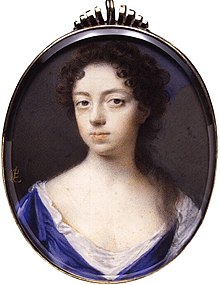Anne Kingsmill Finch
| Anne Finch, Countess of Winchilsea | |
|---|---|
 |
|
| Born | April 1661 |
| Died | 5 August 1720 |
| Occupation | poet |
Anne Finch (née Kingsmill), Countess of Winchilsea (April 1661 – 5 August 1720), was an English poet. Finch's works often express a desire for respect as a female poet, lamenting her difficult position as a woman in the literary establishment and the court, while writing of "political ideology, religious orientation, and aesthetic sensibility". Her works also allude to other female authors of the time, such as Aphra Behn and Katherine Phillips. Through her commentary on the mental and spiritual equality of the genders and the importance of women fulfilling their potential as a moral duty to themselves and to society, the Countess is regarded as one of the integral female poets of the Restoration Era. Finch died in Westminster in 1720 and was buried at her home at Eastwell, Kent.
Finch was born Anne Kingsmill in April 1661 in Sydmonton, Hampshire, in southern England. Her parents were Sir William Kingsmill and Anne Haslewood, both heralding from old and powerful families. She was the youngest of three children, her siblings being William and Bridget Kingsmill. The young Anne never knew her father, as he died only five months after she was born. In his will, he specified that his daughters receive financial support equal to that of their brother for their education, which was an "unusually enlightened view for the times".
Her mother remarried in 1662, to Sir Thomas Ogle, and later bore Anne Kingsmill's half-sister, Dorothy Ogle. Anne would remain close to Dorothy for most of their lives, inspiring poems such as "Some Reflections: In a Dialogue Between Teresa and Ardelia" and "To my Sister Ogle".
Finch's mother died in 1664. Shortly before her death she wrote a will giving control of her estate to her second husband. The will was successfully challenged in a Court of Chancery by Anne Kingsmill's uncle, William Haslewood. Subsequently, Anne and Bridget Kingsmill lived with their grandmother, Lady Kingsmill, in Charing Cross, London, while their brother lived with his uncle William Haslewood.
In 1670 Lady Kingsmill filed her own Court of Chancery suit, demanding from William Haslewood a share in the educational and support monies for Anne and Bridget. The court split custody and financial support between Haslewood and Lady Kingsmill. When Lady Kingsmill died in 1672, Anne and Bridget rejoined their brother to be raised by Haslewood. The sisters received a comprehensive and progressive education, something that was uncommon for females at the time, and Anne Kingsmill learned about Greek and Roman mythology, the Bible, French and Italian languages, history, poetry, and drama.
...
Wikipedia
